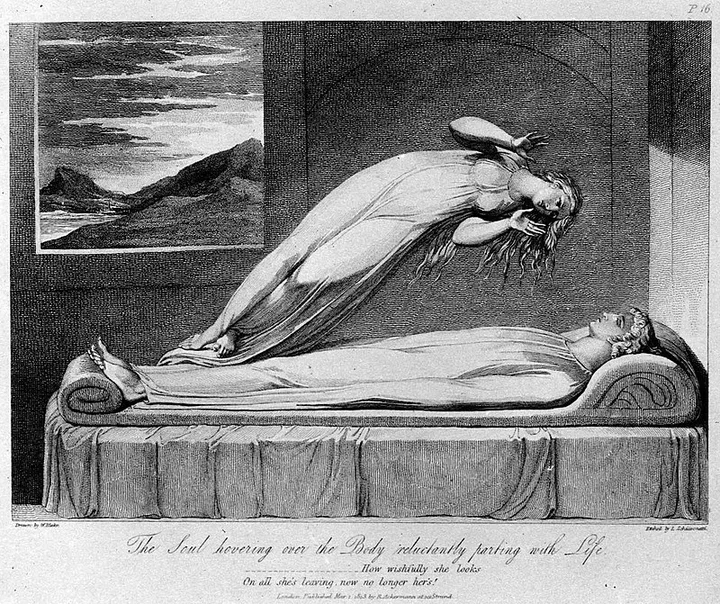My problem with Dr. Duncan MacDougall, who hailed from Haverhill, Massachusetts, isn’t so much that he was a fraud and charlatan, but that he poisoned dogs in his nutty experiments to prove that humans had souls — and that animals didn’t. In the early 1900s, MacDougall aimed to prove once and for all what philosophers from Plato on down had argued about: That humans come in two separate parts, body and soul. The soul (Plato’s anima) arrives when we’re born (or, if you’re a strict pro-lifer, at the moment of conception) and departs when we die. What happens to it after that gets kinda squirly — does it sit around in limbo, waiting for Judgment Day? Does it fly down to Hades or up to Heaven? Or find itself, unwittingly, in another body (human or otherwise)? The possibilities are endless, once you grant the existence of this thoroughly make-believe concept.
Along with many people at the time, MacDougall believed that something — call it soul — was material, and therefore it had mass. All he had to do was to weigh someone at their moment of death and see how much their weight changed. First things first, find folks about to die. Fortunately, he was working at a tuberculosis clinic, and protocols being less rigid back then, he enlisted six patients in their end stages. Four were dying from TB, one from diabetes, one unspecified. “The patient’s comfort was looked after in every way…at the end of three hours and forty minutes, he expired and suddenly coincident with death, the beam end [of the industrial scale on which the patient was lying] dropped with an audible stroke…the loss was ascertained to be three-fourths of an ounce,” he wrote in a paper published in 1907.
That was how he reported for one of his six experimental subjects. What about the other five, you ask? Here, McDougall is rather unforthcoming. He says he ignored one result because the scales “were not finely adjusted,” another died while he was still calibrating his equipment, the others — he doesn’t say. (Presumably he would have said, had the results supported his hypothesis.)
Being the fair-minded scientist he presumably saw himself as, and knowing that animals don’t have souls (only we humble humans do) he did the same experiment on 15 dogs in their death throes. Saying that he was unable to find sick or dying dogs, it’s pretty clear, as author Mary Roach puts it, “barring a local outbreak of distemper, one is forced to conjecture that the good doctor calmly poisoned fifteen healthy canines for his little exercise in biological theology.” (Stiff: The Curious Lives of Human Cadavers)
In any case, once his results (actually, result) were printed in a breathtaking story in the New York Times (March 11, 1907) “Soul has Weight, Physician Thinks,” the tale took off. Three-quarters of an ounce doesn’t really have a ring to it, but once you convert it to metric “21 grams,” you have something catchy to offer the desperate and gullible. There was the (supposedly really good, according to Rotten Tomatoes) 2004 movie 21 Grams. Many songs, including a recent release by a couple of German musicians 21 Gramm. And endless popular references.
Actual photograph of soul leaving the body. (Luigi Schiavonetti, 1808. Public domain via Wikimedia)
MacDougall’s unscientific, biased results were roundly condemned at the time. For instance, following the NYT story, another Massachusetts physician, Augustus Clarke (no relation to our local, very talented artist by that name), noted that after death, the lungs no longer cool the body, leading to sweating and consequent loss of moisture, hence weight loss. (The poor dogs, lacking sweat glands, wouldn’t have exhibited the phenomenon, even granting that MacDougall could register such a tiny change in weight.) Just 20 years ago, physician and chemical engineer Gerry Nahum unsuccessfully tried to sell Yale, Stanford and Duke on his idea that “the soul can be weighed scientifically at the point of (death) dereaction, via measuring its energy-information content, with electromagnetic sensors.” More details here. (I thought engineers were, you know, smarter.)
It’s all bullshit, of course. If you want to make a fast buck, convince folks that they won’t really be dead after they die, and that they can have another shot at life. Since they can only see an inert body when someone dies, convince them that there’s another unseen, ghostly bit that can be saved. And that if they pay you to reveal the secret of eternal life, you’ll live on. With your loved ones! Forever! (I understand that a just couple of weeks of forced confinement with their loved ones at the start of the Covid crisis had many people re-thinking that approach to the hereafter.)
Call me soulless if you will, I’m going to have to pass on that weighty topic. I’m grateful enough for just this one life.

CLICK TO MANAGE